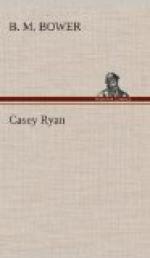Casey had picked up the jack again and was regretfully but firmly adjusting it under the front axle. “That ain’t the first good prospect I ever had pinch out on me,” he observed, trying to be cheerful over it. He could even grin while he squinted up at the lean man.
“Well, now, you can’t hardly refuse to trust a man in my fix!”
“Think I can’t?” Casey was working the jack handle rapidly and the words came in jerks. “You stand there and watch me.” He spun the wheel free and reached for his socket wrench. “I wisht you’d spoke your piece before I set these dam nuts so tight,” he added.
The lean man turned and looked inquiringly at his wife. “Ain’t I honest, maw, and don’t I pay my debts? An’ ain’t my brother Joe honest, an’ don’t he pay his debts? Would you think the man lived, maw, that would set a man with a fambly afoot out on the desert like this?”
“Nev’ mind, now, paw. Give him time to think what it means, an’ he won’t. He’s got a heart.”
The baby awoke and cried then, and Casey’s heart squirmed in his chest. But he thought of Bill and stiffened his business nerve.
“I got a heart; sure I’ve got a heart. You ask anybody if Casey’s got a heart. But I also got a pardner.”
“Your pardner’s likely gen’l’man enough to trust us, if you ain’t,” maw said sharply.
“Yes, ma’am, he is. But he’s got these tires to pay fer on the first of the month. It ain’t a case uh not trustin’; it’s a case of git the money or keep the tires. I wisht you had the money—she shore is a good bunch uh rubber I let yuh try on.”
They wrangled with him while he removed the tires he had so painstakingly adjusted, but Casey was firm. He had to be. There is no heart in the rubber trust; merely a business office that employs very efficient bookkeepers, who are paid to see that others pay. He removed the new tires; that was his duty to Bill. By then it was five o’clock when all good mechanics throw down their pliers and begin to shed their coveralls.
Casey was his own man after five o’clock. He rolled the tattered tires out into the sunlight, let out the air and yanked them from their rims. “Come on here and help, and I’ll patch up your old tires so you c’n go on,” he offered good-naturedly, in spite of the things the woman had said to him. “The tire don’t live that Casey can’t patch if it comes to a showdown.”
Before he was through with them he had donated four blow-out patches to the cause, and about five hours of hard labor. The Smith family—yes, they were of the tribe of Smith—were camped outside and quarreling incessantly. The goats, held in spasmodic restraint by Humbolt and Greeley and a little spotted dog which Casey had overlooked in his first inventory, were blatting inconsequently in the sage behind the garage. Casey cooked a belated supper and hoped that the outfit would get an early start, and that their tires would hold until they reached Ludlow, at least. “Though I ain’t got nothin’ against Ludlow,” he added to himself while he poured his coffee.




